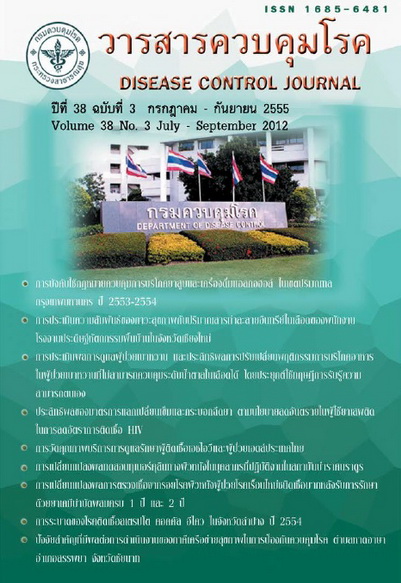Evaluation of DM Care and Application of Self Efficacy Theory to Consumption Behavior Adaptation/Modification
Keywords:
Evaluation of DM Care, Consumption Behavior, Behavior Adaptation/ModificationAbstract
This research was aimed to evaluate the DM patients care by examination of the HbA1c level and the effectiveness of the application of Self Efficacy theory to consumption behavior modification among DM patients who had high blood sugar level. Phase 1 was adescriptive study. The subjects were 120 DM patients who received care at Chumpolburi hospital, Surin province. Interviewing and blood collection were conducted. Phase 2 was quasi experiment study. The subjects were 100 DM patients who were 30-65 years of age and received care from Joho Health Center, Nakhon Ratchasima province. Those subjects were divided into experiment and control group with 50 subjects per group. The experiment group were received the activities for consumption behavior modification, self record for self monitoring, persuasion and arousing activities from patients group and health professionals. There were follow up for blood sugar control and satisfaction survey after 1 year later. From phase 1, there were 35.8% of DM patients who could excellent control blood sugar (HbA1C < 7 mol%) and 15% of DM patients who could fair control blood sugar (HbA1C=7.01-8.00 mol%). The DM patients who were DM less than 10 years could better control 2 times than patients with DM longer than 10 years (33.3% VS 17.6%). From phase 2, after the experiment, the experiment group had higher perception than control group (p<0.001) (22.48 scores VS 13.42 scores) and higher than before experiment (p<0.001) (22.48 scores VS 14.78 scores). The experiment group had higher consumption behavior than control group (p<0.001) (29.12 scores VS 26.26 scores) and higher than before experiment (p<0.001) (29.12 scores VS 26.50 scores). The experiment group had lesser HbA1C than control group (p<0.001) (7.77 mol% และ 11.59 mol%) and lesser than before experiment (p<0.001) (7.77 mol% และ 9.04 mol%). After follow up 1 year later, 90.6% of the subjects had satisfaction to consumption behavior modification activities, especially to recording for self monitoring. Among the subjects 11.8% of them could excellent control blood sugar (HbA1C < 7 mol%) and 32.9% could fair control blood sugar (HbA1C = 7.01- 8.00 mol%). The results showed the effectiveness of the application of Self Efficacy theory to consumption behavior modification among DM patients. Nevertheless, further study should add Social Support Theory to increase the effectiveness of DM patients care.
Downloads
References
2. รายงานผลการดำเนินงานประจำปี สรุปผลการดำเนินงานป้องกันควบคุมโรคเบาหวานและความดันโลหิตสูงและหัวใจขาดเลือดของโรงพยาบาลชุมพลบุรี. รายงานผลการดำเนินงานประจำปี 2548. ไม่ปรากฏแหล่งพิมพ์
3. ศูนย์สุขภาพชุมชนจอหอ. สรุปรายงานโรคเรื้อรังประจำปี, 2549-2552. ไม่ปรากฏแหล่งพิมพ์
4. กาญจนา ปญัญาธร , สุทาทิพย์ เทียนวงศ์ , กรรณิการ์ คลื่นแก้ว , ลักขณา ศิริบูรณ์และอมร คำทะ. การศึกษาแบบแผนการดำเนินชีวิตของผู้ป่วยเบาหวานที่มีปัญหาในการควบคุมระดับน้ำตาลในเลือด โซนราชพฤกษ์ อำเภอเมือง จังหวัดอุดรราชธานี. วารสารการแพทย์ โรงพยาบาลอุดรธานี. 2549; 15 (2): 37-59.
5. อัลเบิร์ตแบนดูรา.ทฤษฎีความสามารถของตนเอง.(Self-efficacytheory) 1997. http://www.novabizz.com/NovaAce/Personality/Self_Efficacy.htm
6. อนันต์ สอนพวง. ปัจจัยที่เกี่ยวข้องกับการรักษาของผู้ป่วยเบาหวานในโรงพยาบาลชุมชน จังหวัดกาญจนบุรี วิทยานิพนธ์ปริญญาเวชศาสตร์ชุมชน
มหาบัณฑิต จุฬาลงกรณ์มหาวิทยาลัย.2541
7. สุภาพร องค์สุริยานนท์.การพัฒนาพฤติกรรมการดูแลตนเองของ ผู้ป่วยโรคไตเรื้อรังโรงพยาบาลเจ้าพระยายมราชจังหวัดสุพรรณบุรีพ.ศ. 2550 วารสารสาธารณสุขและการพัฒนา 2551;6:32-38.
8. สมชัย จิรโรจน์วัฒน และยุทธนา ประนุช เรื่องประสิทธิผลการจัดโปรแกรมการสร้างพลังแกนนำชุมชนเพื่อการป้องกันและ ควบคุมโรคอุจจาระร่วงที่ ต. ตะพง จังหวัดระยอง พ.ศ. 2543. (online)แหล่งที่มา http://www.kmddc.go.th/Library/research/research_dia3.pdf. 23 กรกฎาคม 2555.
9. ศศิธร กรุณา. ผลของโปรแกรมเสริมสร้างแรงจูงใจต่อการควบคุมระดับน้ำ ตาลในเลือดของผู้ป่วยชนิดที่ 2. วิทยานิพนธ์พยาบาลศาสตร์มหาบัณฑิต สาขาการพยาบาลผู้ใหญ่ มหาวิทยาลัย ขอนแก่น.
Downloads
Published
How to Cite
Issue
Section
License
Articles published in the Disease Control Journal are considered as academic work, research or analysis of the personal opinion of the authors, not the opinion of the Thailand Department of Disease Control or editorial team. The authors must be responsible for their articles.






